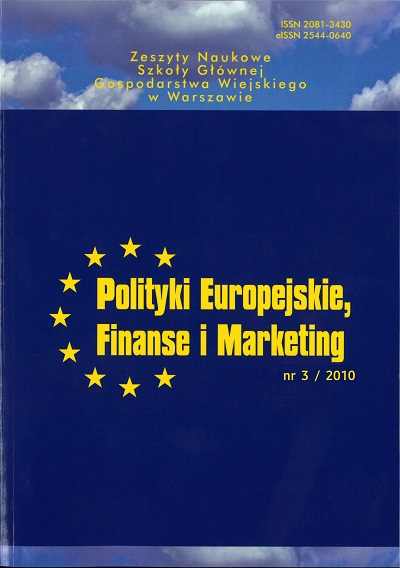Main Article Content
Article Details
Aaker D.A.: Strategic Market Management. 6th Edition. John Wiley & Sons Inc, New York 2001.
Armstrong J.S., Brodie R.J.: Effects of portfolio planning methods on decision making: Experimental results. International Journal of Research in Marketing 1994, 11. (Crossref)
Boulding W., Staeling, R.: A look on the cost side: Market share and the competitive environment. Marketing Science 1993, 12. (Crossref)
Buckley P.J., Pass C.L., Prescott K.: Measures of international competitiveness: A critical survey. Journal of Marketing Management 1988, 4(2). (Crossref)
Buzzell R.D., Gale, B.T.: The PIMS principles: Linking strategy to performance. Free Press, New York 1987.
Buzzell, R.D.: The PIMS program of strategy research: A retrospective appraisal. Journal of Business Research 2004, 57,. (Crossref)
Cohen G., Pena de Lagada S.P., Gil Roig J.M.: Competitividad de las exportaciones argentinas de fruta a la Unión Europea: su análisis mediante los métodos del Boston Consulting Group (BCG) y la matriz refinada de Viaene-Gellynck. Revista Facultad de Agronomia 2000, 20(3).
Doyle P.: Marketing Management and Strategy. Prentice Hall International, London 1994.
Hamel G., Prahalad C.K.: Competing for the Future: Breakthrough Strategies for Seizing Control of your Industries and Creating the Markets for Tomorrow. Harvard Business School Press, Boston 1994.
Grunert K.G.: Research on agri-chain competence and consumer behaviour. EUWorkshop on Agri-Chain Competence: Learning from other chains. The Netherlands, 1996.
Grunert K.G., Harmsen H., Larsen H.H., Sorensen E., Bisp S.: New areas in agricultural and food marketing. (w:) B. Wierenga; A. van Tilburg; K. Grunert; J-B.E.M. Steenkamp & M. Wedel (eds.). Agricultural Marketing and Consumer Behavior in a Changing World. Kluwer Academic Press, Boston 1996. (Crossref)
Hedley B.: Strategy and the business portfolio. Long Range Planning 1977, 10(1). (Crossref)
Jedliński B.: Polityka handlu zagranicznego. Wydawnictwo Uniwersytetu Gdańskiego, Gdańsk 2002.
Kennedy P.L., Harrison R.W., Kalaitzandonakes N.G., Peterson H.C., Rindfuss R.P.: Perspectives of Evaluating Competitiveness of Agribusiness Industries. Agribusiness 1997, 13(4). (Crossref)
Lagnevik M. Kola J.: Are Porter Diamonds forever? w: W.B. Traill, E. Pitts (eds). Competitiveness in the Food Industry. Blackie Academic & Professional, an imprint of Chapman & Hall, London 1998.
Lichtental J.D., Wilson D.T.: Becoming Market Oriented. Journal of Business Research 1992, nr 24. (Crossref)
Mohd M.I., Alias R.: Competitiveness of the Malaysian food processing industry. Universiti Putra Malaysia Press, Serdang 2004.
Moutinho L., Brownlie D.: The stratlogic approach to the analysis of competitive position: Making use if the strengths of the general approach to portfolio analysis. Marketing Intelligence & Planning 1994, 12(4). (Crossref)
Pierścionek Z.: Strategie konkurencji i rozwoju przedsiębiorstwa. PWN, Warszawa 2003.
Porter M.E.: The Competitive Advantage of Nations. The Macmillan Press Ltd, London 1990. (Crossref)
Saloner G., Shepard A., Podolny J.: Strategic management. John Wiley & Sons Inc, New York 2001.
Söllner A., Rese M.:. Market segmentation and the structure of competition: Applicability of the strategic group concept for an improved market segmentation on industrial markets. Journal of Business Research 2001, 51. (Crossref)
Taggart J.H., Harding M.S.: The process of subsidiary strategy: a study of Ciba-Geigy classical pigments. Management Decision 1998, 36(9). (Crossref)
Traill W.B.: Foreign trade versus foreign direct investment in the food sectors of transition economies. (w:) M. Hartmann, J. Wandel (eds.). Food processing and distribution in transition countries: Problems and perspectives. IAMO, Wissenschaftsverlag Vauk, Kiel 1999.
Viaene J., Gellynck X.: Market integration and the small country case: Pressure on the Belgian meat sub-sector. IAMA-Congress: The new trade environment, Paris 1995.
Viaene J., Gellynck X.,: Distribution structure and image of the Belgian meat industry in France: Image and marketing strategy. Report II, Ghent University, Ghent 1989.
Viaene J., Gellynck X.: Impact of Globalisation on Competitiveness of the Belgian Frozen Vegetables Industry. (w:) R.J. Loader, S.J. Henson, W.B. Traill (eds.). Globalisation of the Food Industry: Policy Implications. University of Reading, Reading 1997.
Viaene, J., Gellynck, X.: Introduction to the Conference: Objectives and Overview of Research Methodology. (w:) M. Pourova (ed.). Proceedings of the International Scientific Conference on EU-Integration and Agri-Food Sectors in The Czech Republic and Poland: Challenges and Opportunities for the Food Sector. Kufr, Prague 1998.
Wziątek-Kubiak A.: Analiza konkurencyjności polskiego przemysłu w okresie transformacji. Working Paper nr 4 INE PAN, Warszawa 2000.
Downloads
- Jacek Strojny, Wiesław Musiał, Obszary wiejskie w systemie ekonomiczno-społecznym państw Unii Europejskiej , Zeszyty Naukowe SGGW, Polityki Europejskie, Finanse i Marketing: Nr 22(71) (2019)

Utwór dostępny jest na licencji Creative Commons Uznanie autorstwa – Użycie niekomercyjne 4.0 Międzynarodowe.





